To me the take-away from this most unique of photo expeditions can be summed up in the expressions; surreal, is this for real, it really isn't real but we can make it real. How do you describe your joy after camping in the rain for two nights and you get to a really well appointed hotel, charge into the shower praying for hot water and out of the shower head comes a blast of freezing water. Yes, the knob is red and says hot and you know that the sun was shining all day and the solar system should be working. After much time getting frost bitten I turned the red one off and the cold blue one on and suddenly a blast of scalding water hit my skin and turned me red. Not wanting the next guest to think unkindly of the hotel I pried off of the knobs and rearranged them to the reality of the water temperature that would hopefully come down.
|
Photo: Jeremy Woodhouse Ethiopia, Abyssinia the birthplace of civilization has been my home for the past two weeks as myself and photo leader extraordinaire Jeremy Woodhouse sheparded ten photo enthusiasts through the remote Omo Valley. Guatemalan photo journalist Holly Wilmeth was part of our team and she mentored, cajoled, provided invaluable asisstance and smiled her way through the trip.
To me the take-away from this most unique of photo expeditions can be summed up in the expressions; surreal, is this for real, it really isn't real but we can make it real. How do you describe your joy after camping in the rain for two nights and you get to a really well appointed hotel, charge into the shower praying for hot water and out of the shower head comes a blast of freezing water. Yes, the knob is red and says hot and you know that the sun was shining all day and the solar system should be working. After much time getting frost bitten I turned the red one off and the cold blue one on and suddenly a blast of scalding water hit my skin and turned me red. Not wanting the next guest to think unkindly of the hotel I pried off of the knobs and rearranged them to the reality of the water temperature that would hopefully come down.
0 Comments
iPhone Photo, Jeremy Woodhouse Ethiopia is the birthplace of coffee and to drink a machiato in the Tomoca coffee house located in Addis Abba is the ultimate coffee centric experience. With a unobtrusive store front off the bustling Churchill Road, the 62 year old coffee bar shows little sign of change. The rusty and faded Tomoca banner is the color of a weak latte and the size of the sign and typography all say pure, true to spirit, perfection.
Behind the raised cashier counter are two serious looking women in their freshly laundered orange blouses. They don't smile and rarely talk, just let you know that the best coffee you will ever drink in your life costs a fraction of what you will pay in your home country. Machiatto for 30 cents, U.S. You tell them what you want and they dispense the chips. Small white is a latte, large black is macchiato, white chip indicates a simple strong black cup, round white means with milk. In the back is a long thin counter with cups of different sizes. Directly centered is the Habesha women dutifully cleaning the coffee cups in soapy water and then drying them with a well worn towel. To her left and right are the ancient coffee presses each manned by gents who have roasted, ground, scooped and filled the machines for many years. When I asked one of these artisans how long he was doing it, he replied, “before you were born”. Like the coffee — simple, strong and with feeling. The coffee is poured and you know yours is ready when your chip has a cup in front of. You grab it and sip from the cup, all the while observing the regulars perched low on a wooden bench. The younger folk at the four high counters talking about life and liberty. The television, high on the wall, has its sound off and the news on. There has been a raid in the center of Paris. Terrorists are dead. Time stands still, drinking coffee as a spiritual activity, total tranquility. Great way to start a trip or end one. Will be back soon. If you think that New York City is the place for wild taxi rides, try going to Kolkata. After eating my last chicken tandoori of the trip, it was time to get a taxi back to my hotel. Even though it was nine-thirty at night, it felt like 100 degrees with 100 humidity, plus the streets were teeming with people. It seemed that everybody was also trying to get a yellow Ambassador cab of which there were few. After waiting patiently for around 20 minutes, and watching people pummel each other for the use of one of these iconic cars, I dove in to a taxi that stopped close to me while fending off five other prospective riders. I showed the driver the hotel's business card, which was five minutes away, hoping he would know where this busy main street is. I also told him the address in English, so he turned around and said 150 rupees and I said go, knowing that the fare was only 50. Off he went like a coked up Nascar racer. After about five minutes I realized he was going the wrong way, and gave him the card again. This time, he studied it intently, but it was upside down. He didn't understand me, and I didn't understand him but this was my last night, I just had a great meal and it was an another opportunity to really experience Kolkata. Eventually he realized he was lost and asked a traffic cop who was in a white uniform where to go. We finally made it back after running three red lights, almost knocking over a Tuk-tuk, and driving on the sidewalk. He screamed his price at me, 200 rupees. I happily gave him 100 for a ride that should have cost 50, jumped out of the taxi and smiled. On the way out, the driver yelled at me "ghar ka ladka", I thought he was asking me if I wanted to eat a latke, but I learned later on that he said I was "one of the family". I love Kolkata.
When traveling I sometimes meet people and wonder what my life would be like if I was born into their situation. After all it is just a matter of luck, chance, and predetermination that I was born where I was. As my trip to remote India was ending I asked my trusty driver Yalen, who spoke minimal English if he was able to drive me to the Dibrugarh airport so I could catch my flight to Kolkata. I wasn't sure he fully understood my question but he quickly answered that he would be driving me to America as well. We had a good laugh together and it was a shared moment that made a really challenging adventure into something that was a great tale to tell once I returned home.
My guide Chada was also going home after the trip to his home Ziro, in Arunchal Pradesh, India. I spent three great days there and knew that his town had unpaved roads, cows, pigs and stray dogs roaming freely. Plus, it was home to the Apatani people whose women disfigured their faces so that the neighboring Nishi tribe, who believe in taking multiple wives wouldn't raid them. Until thirty years ago the women would wear nose plugs and tattoo their faces. Chada understood my fascination and and interest in photographing these women and felt comfortable taking me around as he saw that I was just as interested in hearing about their lives and what made them happy, as well as taking photographs. I told Chada that I would be taking a four hour flight from Kolkata to Dubai, and then a fourteen hour flight to New York. He was interested in hearing the details and sharing his knowledge of Dubai. For many Indians Dubai is the promised land, a short flight away where their are opportunities to make more in a month than they can make in half a year at home. He too was taking a sixteen hour trip to go the 180 miles to his home. The overnight bus would take twelve hours and cost him 700 rupees, which is $11 U.S.D . I asked if it had bathrooms and he said no, but that it would stop once so that people could eat. Hearing that the bus only made one stop made me think that the Indian bladder must be exceptionally large. He would then take a shared Mahindra taxi for four hours that would cost 300 rupees, $5 U.S.$. Once in Ziro he would take the ten minute ride in a tuk tuk. After hearing that, all I could do is contemplate the difficulty of his journey. Here I was taking Emirates A380, a massive,comfortable plane with more indoor plumbing than his entire village, being fed three meals and having attractive stewardesses offering me free drinks and snacks. He would have to wait outdoors for the shared taxi in Itanagar while I would be in the Dubai lounge watching the news, reading four magazines at once and seeing how much free food I could eat in the two hour lay over. It sure would be incredible if he could have the opportunity to take a flight and experience what I take for granted. It makes me realize how fortunate I am to live the life I live. The lesson learned is, don't sweat the small stuff, if you weren't who you are, you might be in that bus to Ziro. Then again, Chada was really looking forward to getting back home to his wonderful wife and his three sons. I could have been him, and he could have been me. I have had the pleasure of staying at some wonderful hotels full of ambiance, great design and all the creature comforts that you can ask for. When traveling I am not one to analyze the towels, thread count or brand of soap in the bathroom. All I want is a clean room, a window to look out of, and hot water. When I organized my trip to Arunachal Pradesh, the tour operator wrote in the itinerary that the hotels would be basic, which I took for no frills, meaning a hot and a cot. In the town of Pasighat, which just opened up to foreign visitors I stayed at the Aane Hotel and experienced what the Indian traveler considers fondly as a hole.
Four stories tall with one side of the building half open, because the builder ran out of money, cement or thought this was a way to air cool in the building was what I drove up to. I lugged my pack up the stairs to the reception area, and behind the counter was this sour faced man in a drab dirty uniform. He was having a loud conversation with four guys all in wife beater t-shirts, no shoes or flip flops and matching brown pants. He gave me the key to room 203 and pointed towards the stairs and as soon as he did that, the four guys all started to scream at one another about who was going to take my bag upstairs. Before I headed toward the stairs the man handed me a towel that looked like it was used to dry cars in a car wash, and a bar of soap that that lost its chemical composition and was oozing out of the wrapper. Outside of most of the rooms were trays littered with moldy plates of food and empty liquor bottles. The hallway was dark, and the door to the room across from mine was open and the smell of cigarettes was enough to give you cancer by contact. I turned the key in the lock, but the door didn't open. After three futile attempts one of the screaming men from earlier on came carrying my bag and tried his luck. He too had trouble, and eventually punched the door and which caused it to fly open. I saw the spot where he punched it, and this wooden door had definitely been punched many times. We entered the room and he dropped my bag, put his hand out and shouted in my face, "Money now!" I laughed, shook his hand, smiled and whispered, "Money later." He didn't understand this, and walked out of the room. I heard him screaming once he got to the reception area. The floor had layers of caked dirt, the bed was basically a board with a sheet on it, and the pillow stopped being a pillow years ago. The night table was ornate, yet wobbly and not something I would put my watch on. When I stepped onto the wet bathroom floor, found the toilet seat wasn't attached to the toilet and the shower head was hanging down and oozing, I knew that I would not be opening the door again. I decided I would be joining the ranks of millions of Indians who brush their teeth in front of their homes and find another place to do my business. When my tour operator asked me how I found Hotel Aane I asked him what he thought of it. He said the other foreigners stayed there and never complained, I asked how many last year and he replied; four. I wanted to photograph the room, but didn't want to take my camera out in the room. I slept in my sleep sack, put some clothing in a pillow case that I brought from home and didn't even open my suitcase. With the help of Ambien, I slept six hours and carried my own bag to the car. Goodbye Hotel Aane in Pasighat, I will not be back. Catherine Farquharson, co-leader on Epic Photo Tours Sept 2014 trip to the Omo Valley has produced a magazine which features images made by the participants on the tour. If you buy the magazine a large chunk of the money will go towards supporting Omo Child, an organization formed to rescue and care for children who are victims of Mingi.  68 pages, published 1/22/2015 After travelling to the Omo Valley in Ethiopia, a group of photographers produced this limited edition magazine as a fundraiser to help the non-profit organization OMO CHILD. All proceeds from sales will be donated to help saving Ethiopian children's lives through this organization. The Gujarati thali is perhaps the most balanced meal in India. It derives its name from the plate that the food is served on. The kansa plate is an alloy of copper and tin and I have been told that eating from it is good for your memory. I am not so sure about that as I have misplaced my camera battery, jacket and charger about 10 times over the course of 12 days.
After the group sat I counted nine waiters and food servers hovering around our table. India, being a labor-centric country, always seems to have twice as many people doing a job than required. These white-turbaned gents zoomed around the table dropping a sweet dish, farsan, kadhi, rice, roti, potato vegetable, green vegetable, dal and chat onto our plates. Once my plate was full I glanced over at Di who hails from Australia and saw her carefully observing her plate. She has an incredible eye for detail which makes her a talented photographer and her dry wit makes her fun to travel with. We silently nodded at each other and the food. She then whispered that a mushy green object with thorn like tentacles, that just was placed on her plate reminded her of something pretty similar to what she stepped in earlier while dodging cattle in the back alleys of Ahmedabad. I am not fully versed in all of Gandhi's teachings and philosophies but have read of his love for rural village life and his hope that these simple, unelectrified places would be the driving force in his emerging nation. Uneducated villagers working their looms, making kitchen utensils and plowing their fields have been evident to our group over the course of the past 12 days. Spending an afternoon photographing in Wadhwan was a unique experience for all.
As we exited our cars we could hear the rhythmic banging of hammer on brass and copper. The long, narrow main street had stalls selling everything from A to Zed as one storekeeper told us with a gentle bob of his head. The omni present barber shops charging 30 - 50 rupees (less than $1 USD) were occupied by men chatting away in Hindi and a dialect that I was told was full of slang, metaphor, and phrases based on agrarian life. The walls were adorned with calendars with their favorite Baba's. Living in a consumer oriented society where everything is massed produced and machines do the work of people it was amazing to see these men at work.I photographed copper sheets being transformed into drinking cups, heavy brass bowls being shaped and then placed into small fire pits. All would soon be bought by itinerant sellers and sold all over Gujarat.Many would beused to collect buffalo milk. These men were not wearing masks, and the fumes irritated the eyes of many in the group, and is was a surreal scene as these small workshops found all over Wadhwan turned raw material into a usable product. These guys receive a salary of about $110 per month for their long days. I am not so sure that Gandhi would approve of these sweat shop conditions! I have come to believe that this Hota Hai is an expression that sums up what it means to travel in India. To travel in this multi-caste, extremely complex society one is a participant in a play, or better yet a comedy. Hota Hai means, "whatever will be will be", "that is the way it is", "go with the flow", "don't worry things will eventually turn out the way you may, or may not like it". Here are a few of my favorites.
At a toll plaza the the collection booth looked like a bombed out cement bunker. The walls were covered with dirt and dried mud, and the sullen guy in the booth looked like he had not washed or changed clothing in weeks. My driver believed he had been locked in the booth so he wouldn't run away with the toll money. We pulled in and paid the 100 rupee fee ($1.50USD). While waiting for change the horns in the cars behind us started to blare. We then learned that the computer that prints the tickets was broken and we would have to wait for a receipt and my driver wasn't leaving without his .30 cent change. Within minutes about five toll plaza employees arrived at the scene and they got into a heated discussion about what to. I cajoled my driver to hit the gas after I heard that we may be there for hours. He was hesitant until Bob from California gave him 100 rupees and told him not worry about the change. We raced out of there and about 100 feet later we saw a Rabari tribal man crossing the road with his camels. The driver said that without Bob's generosity we might have had to sleep in the car waiting for them to fix the machine. I am not sure that camels and computers can exist on a major toll road. I just hope the guy imprisoned in the toll booth finds a way out real soon. Seems like a hard way to make a living. Sandy from Seattle just spent 18 hours traveling to India and Bob from California just completed a 15-hour flight. They landed and arrived at the hotel at 3:30am eager to get to their rooms. But after having their passports copied three times they were told that the master key for their rooms wasn't working and they would have to wait. They sat in the lobby until 6:00am unil someone could figure out how to get the keys working. Imagine a 130-room hotel without a master key. At another hotel the rooms that we reserved and paid for five months ago were not available and had people in them. Afer a testy exchange of words with the manager I convinced him to give us free internet. He then dialed his boss in Delhi who preceded to call the owner in Mumbai who after letting me know that if we came in July during monsoon season we wouldn't have this problem. He eventually consented and at dinner the manager gave us the internet passwords needed to log on. As expected, there wasn't any internet service in the hotel. When I let him know that his gesture was pretty useless he asked me if I would consider working in the hotel as I had some good ideas about the hospitality business. Later on the manager who by then was like family to me asked in what way he could make my group happy. I told him of the groups love of lime soda. He was very happy to hear of this and in front of me called the restaurant manger and ordered these concoctions for us. When we arrived at the restaurant I made the assumption that they wouldn't be ordered and my premonition was correct. I went over and ordered them and we received them at the end of meal. The waiter said that he never received a call and he had to get a staff of three to make these delicate drinks. I asked why three and he explained that one person needed to pour the syrup in, one to put the exact amount of sugar in and the third to put true lemon juice in. I commented that it seemed pretty complicated and he agreed and said it is like a chemistry experiment to get it just right. After another great day in Gujarat we returned to the hotel and the manager was at the front door with a man that I assumed was his assistant. I thrust my bag into this gents hands and threw my jacket over his shoulder in a playful manner and gave him my room key. He happily grabbed it and off we went to my room. I then noticed that he didn't know how to open the door. I later commented to the manager that his staff should receive training on how to open doors. He asked why and I told him what just happened. He then let me know that he thinks that the fellow who carried my bag was another guest. Photographing the copper and brass workers in Wadhwan was fantastic. Buildings from the 1700's, cattle crap everywhere, women in beautiful sari's, playful children, dudes with white turbans, a man with incredibly hairy ears, geriatric men in turbans and large framed, jet black sunglasses all made for a terrific afternoon of photography. I passed this one building with massive wooden doors, with huge brass handles, intricately carved columns and a tree growing out of the one mud caked walls. I was approached my a man who let me know that it was his house and he proceeded to take out at key that probably weighed more than I do and opened the door. In front of me was a mosaic of wooden buildings, magenta covered walls, rooms without roofs and an surreal sense of decay; ruin porn at its best. This building is a metaphor for India, illusionary, full of promise, living in the past, uncertain of the future. Returning to my room at seven o'clock in the evening I found my room the way I left it at seven o'clockin the morning. Not really a housekeeping dependent type person I was not troubled by the fact that no one came to give me a clean towel. I heard a knock on my door and opened to find three guys and a trolley who were eager to mop the floor and clean the room. Through the use of some nonverbal communication I let them know all I wanted was a clean towel. They really didn't get what I wanted and one guy charged into the bathroom and started to to rearrange my toothbrush and tooth paste. I diplomatically tossed them out of the room and gave them a chocolate bar as a gift of thanks, they smiled profusely and took off. Later that evening as I walked to the elevator I saw a door half open and peeked in to see my three pals sprawled out on beds munching away on the chocolate bar while the television was blaring a bollywood movie. I was happy that they were enjoying the hotel facilities. I find the use of language in India fascinating. The other afternoon as I was roaming around the kite market in Ahmedabad shooting the kite string makers, kite makers and boys mixing the glass powder to coat the strings, numerous people asked me from "from where do I belong". That can be translated to "what country are you from". That sense of belonging to a village, town, city or country gives people in India a collective identity. So many of the warm and welcoming people that I have encountered here in Gujarat have inquired where I am from, and immediately asked me how I liked India. When I respond that I love being here, their emotional, and at times physical embrace, gives me a case of travelers delight. These people are proud of their place and I don't sense it in a nationalistic way but in a spiritual way. They belong to India, and while I am here I feel that spiritual, physical attachment as well
It is seven o'clock in the morning and the group of 11 photographers arrives in a the hamlet of KhodiyarNagar. It is not a place foreign travelers will ever visit unless they have a connection. Our good friend Ranjit Sinh Parmar proprietor of the Niwas Palace, whose family has been residing for 100s of years is a descendent of the princely class and he can trace his family back 27 generations. His visit is unplanned and the residents of the mud brick houses scattered along a narrow strip of land bordered by cotton fields are just waking up. The first cooking fire of the day is being lit and the most wonderful tea that I have ever experienced is being prepared. The milk is being being squeezed out of the cows, goats and buffalos. While we document this mediaeval way of life in awe, the residents are oblivious to us. But, as the tea is ready, we become the center of their attention. They offer to share their first cup of tea with us and this offer is another gift that travel gives you. It is not tea that they are offering us; tea is an idea. It is hospitality, friendship, and a shared human experience. In rural India; the guest is god. They think that we are important, who else would drive into a hamlet where electricity doesn't exist and people sleep in one room and their animals in the next. The tea is a profound gesture of affection. These people live an uncluttered life. We are on the same planet but of a different world. |

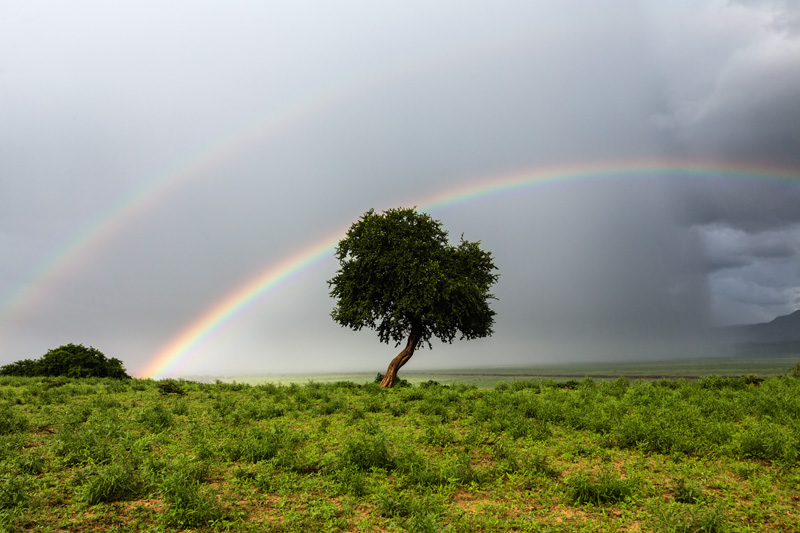
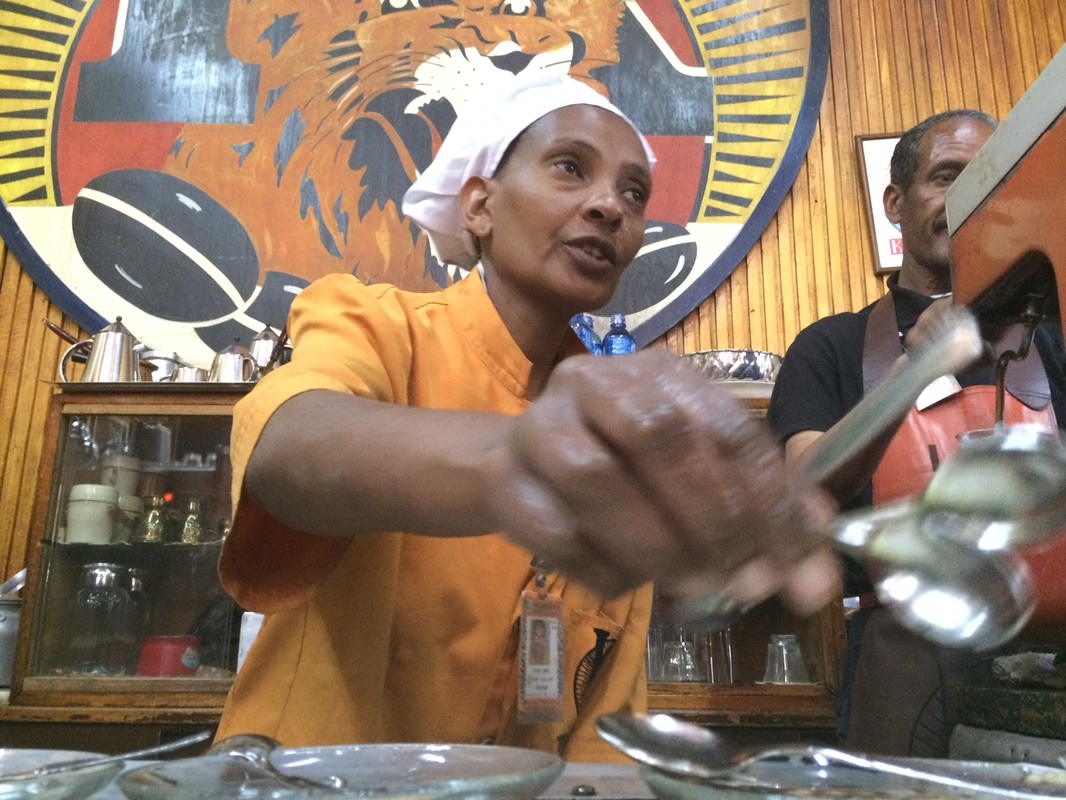
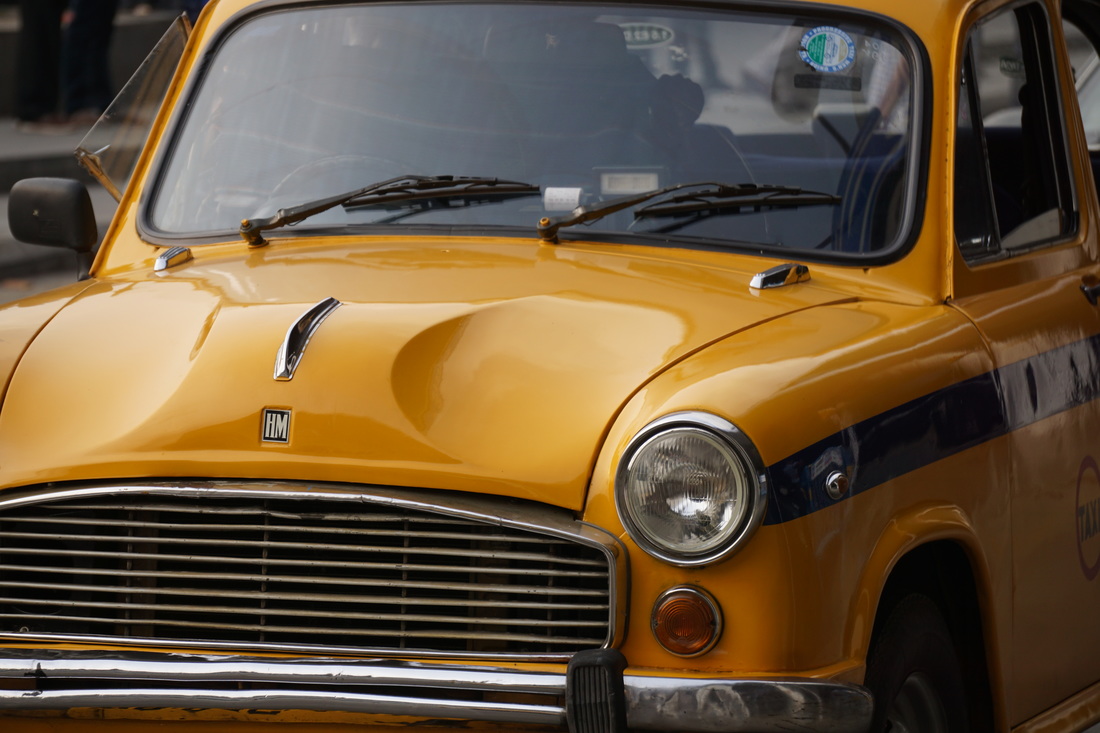
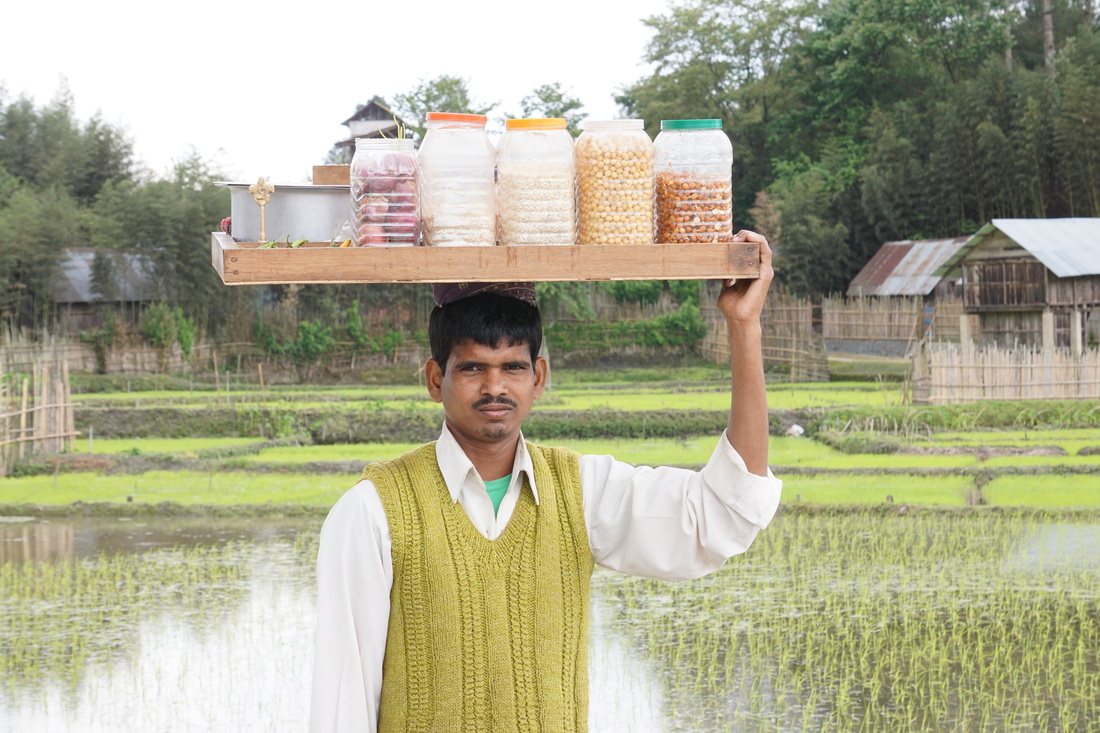
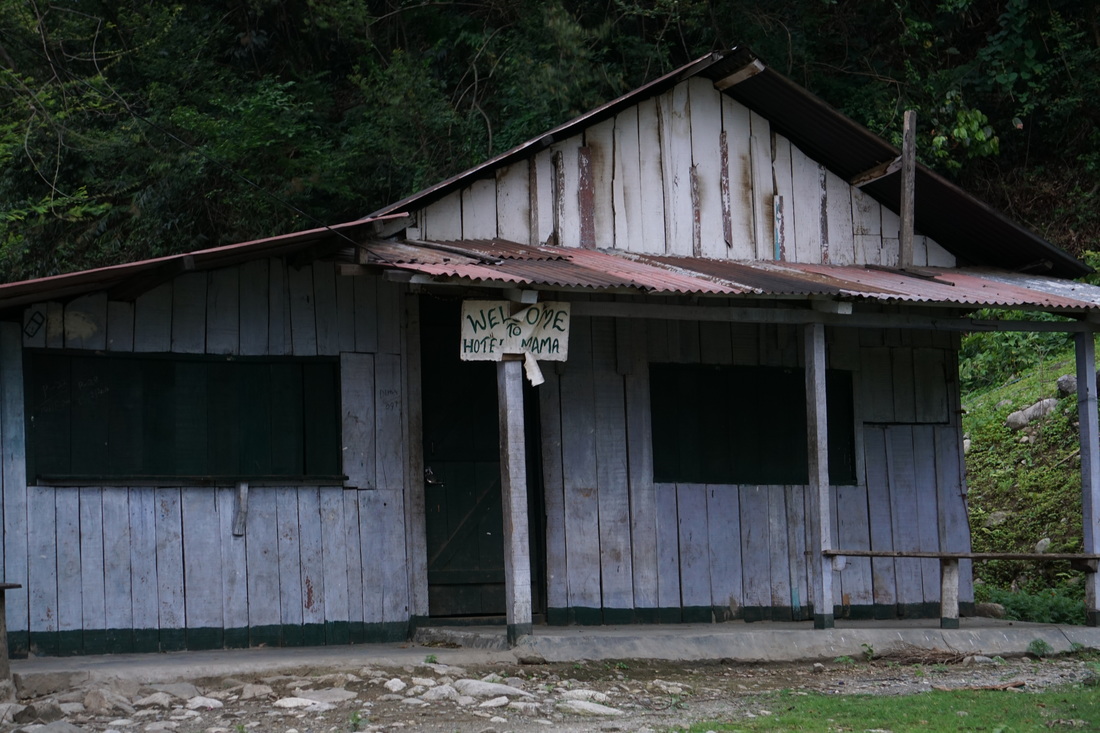

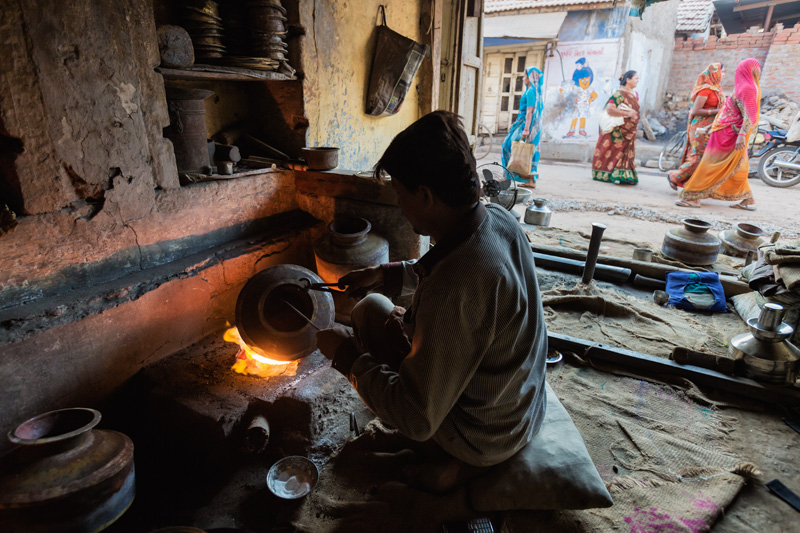
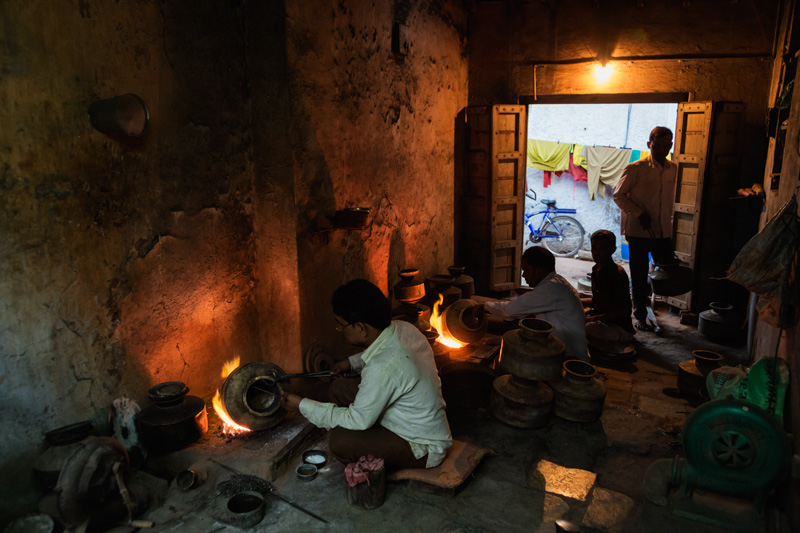
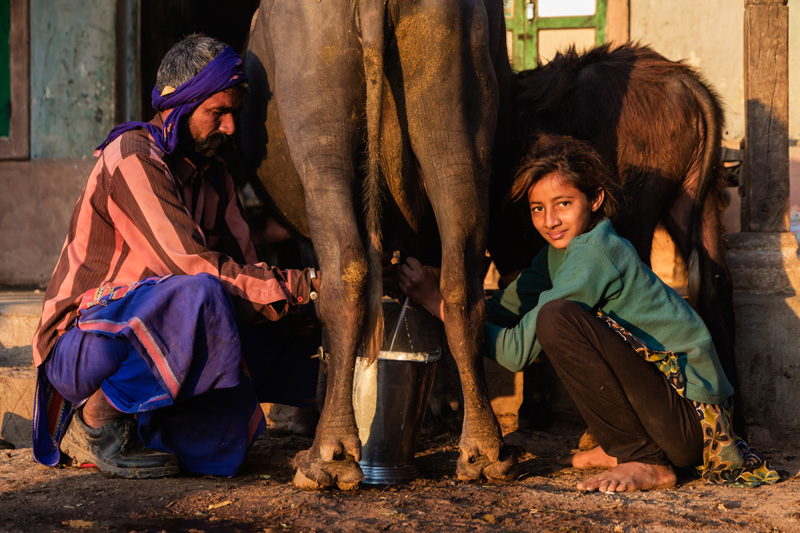
 RSS Feed
RSS Feed